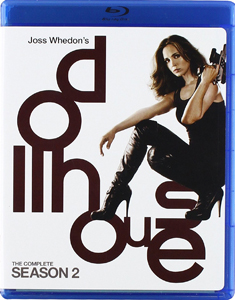For anyone who wanted to look closely, the “Dollhouse”–Philip K. Dick comparison has been obvious since the first episode, but it has really struck me during this more serialized second season.
For my readers who are PKD fans but haven’t watched “Dollhouse” (8 p.m. Central Fridays on Fox, returning with new episodes Dec. 4), here’s a primer: The titular organization has a cadre of “dolls” — human beings whose minds can be wiped and reprogrammed with different personalities; they can then be rented by high-paying clients. Usually the clients want the dolls for sex or violence, naturally, but not always.
Various points of view
Although Fox has hyped up the star, Eliza Dushku, as lead doll Echo, “Dollhouse” actually wavers between various points-of-view (as PKD often did, even within chapters). The closest to a regular protagonist is Ballard, the FBI agent investigating the Dollhouse and the cruelty of the organization toward its dolls. (Any perceived cruelty is open to interpretation — on one hand, the Dollhouse handles its dolls with care.
On the other hand, IT TURNS HUMAN BEINGS INTO DOLLS. On the other hand, all of these humans consented to becoming dolls. On the other hand, IT TURNS HUMAN BEINGS INTO DOLLS. And so forth.) However, some episodes don’t feature Ballard at all; last week’s told the story of doll Sierra, and gave insight into doll programmer Topher.
I’m pretty excited about noticing the “Dollhouse”-PKD connection. Although a fair number of PKD works have been made into films, the late author doesn’t have much of a TV presence. (I suppose the closest would be “Total Recall 2070,” a spinoff of the movie “Total Recall,” which was an adaptation of the PKD short story “We Can Remember It for You Wholesale.”)
PKD meets modern sci-fi TV
As far as I know, PKD didn’t do a story exactly like “Dollhouse,” where one body is a vessel for multiple characters. However, if he hadn’t died prematurely, I think he eventually would’ve done something like this.
He did a ton of stuff with characters caught in a bizarre reality because of drugs (“A Scanner Darkly”) or government experiments (“Time Out of Joint”). He invented people who weren’t really people, but rather scientific creations (“The Simulacra” and “We Can Build You”).
He stored personalities in a vault, just like the Dollhouse does (in “Ubik,” folks can visit their dead relatives for a certain amount of time before their essences completely die). Arnold Schwarzenegger’s “Total Recall” character (based on a PKD short story) is programmed with memories, just as the dolls are programmed with personalities (and the memories that go with them).
Let’s dig deeper into the “Dollhouse”-PKD parallels:
The parallels
Ballard as the somewhat pathetic protagonist.
This guy is totally a PKD character. As he’s investigating the Dollhouse, he engages in a tryst with his neighbor, Mellie. PKD’s relationships were often convenient but deeply felt, often taking place within an apartment building (or “conapt” in PKD-ese).
Ballard can only find love with someone who’s not even real — it turns out that Mellie is a personality programmed into a doll, November, by the Dollhouse. Obsession with unreal things was a central theme of “Do Androids Dream of Electric Sheep?,” where Deckard wanted a new electronic animal to take care of.
Last season, Ballard led an almost-suicidal assault on the Dollhouse; impulsive hero acts are a common PKD protagonist trait. (Ballard is now continuing his investigation a little more on the down low, but a viewer gets the sense that someone higher up the food chain is letting him do this.)
To take this further into PKD-land, the writers should have Ballard awkwardly try to pursue a relationship with November (who, of course, doesn’t know who he is).
Topher as the “villain.”
Topher is the Dollhouse’s technician, the guy who wipes the dolls’ minds (via “treatments” in the show’s parlance) and implants new personalities. He enjoys pushing the scientific envelope so much that he is accused of having no morals, even by his morally questionable bosses.
Like “Dollhouse,” PKD novels never have the dull, mad-scientist villains, they just have foils who are on the wrong side of the law (well, the right side, technically, but since the right side is evil, it’s the wrong side from the good guys’ point of view).
The bizarrely evil government.
PKD’s governments are always doing weird, over-the-top stuff, and while this causes problems for average citizens, we also see how incompetently the government is run. This whole Dollhouse thing totally fits — it’s almost certainly supported by the government, because it’s too out in the open to be an underground operation; at the same time, having it so out in the open is arrogant and sloppy, just like a PKD conspiracy.
The Dollhouse conspiracy seems kind of like the subprime mortgage scheme — it’s happening right under our noses, and I think the villains of the piece are just hoping to cash in and get out before anyone calls them on it.
Echo’s backup-singer personality.
If PKD was writing “Dollhouse,” he wouldn’t bother with the obvious episodes about people renting Echo and other dolls for violence or sex. But he would totally do something off-the-wall like the early Season 1 episode where Echo is rented out as a backup singer to a pop diva. It’s not beloved by fans, but I think it has a certain “so weird that it works” charm; PKD’s books almost always worked because of their weirdness.
Echo’s “character” arc.
Dushku has three distinct roles. Her real personality (the one she was born with, so to speak) is Caroline, a college student. Her blank-slate, wandering-around-the-Dollhouse-in-sweatpants personality is Echo; Echo is helping Ballard to take down the Dollhouse by secretly keeping notes of things she remembers. And then her third role is whatever personality she’s programmed with in a given week.
I’m reminded a bit of PKD’s “A Scanner Darkly,” where a detective is investigating a crime that he himself committed, only he doesn’t realize that he did it. Another reference point is “A Maze of Death,” where the characters experience a reality that they slowly realize is fake. The PKD characters’ realities melted together in their brains, and Caroline/Echo/Whoever’s personalities are melting together in her brain.
Are some of the non-dolls actually dolls?
We recently found out that Dr. Saunders is actually a doll (and therefore a real person before that), and it totally messed with Saunders’ head when she found this out (she wasn’t supposed to find out, of course).
It’s reminiscent of how Deckard in “Do Androids Dream of Electric Sheep” is bothered by the possibility that he might be an android. Some “Dollhouse” fans have speculated that Dr. Saunders/Whiskey is just the first of several supposedly non-doll characters who are actually dolls.
“Dollhouse,” as is always the case with sci-fi shows on Fox, is in danger of being canceled at any moment. I hope that before that happens, it delves further into PKD territory.
Although it’s edgy by mainstream TV standards, “Dollhouse” is tame compared to the writings of PKD, whose imagination was boundless. I’d advise that the show needs to keep getting weirder. Have Ballard become obsessed with November. Have Echo’s brain go haywire between her multiple personalities. Have Topher tell his bosses to take this job and shove it.
Recent episodes suggest that “Dollhouse” creator Joss Whedon is already going in this direction. Indeed, it seems he has created yet another show that will be canceled too soon — and just when it’s getting really good (see also “Firefly” and “Angel”) — but which we’ll be talking about for years. Kind of like how PKD died too young, but his stories still give us plenty of things to talk about.


